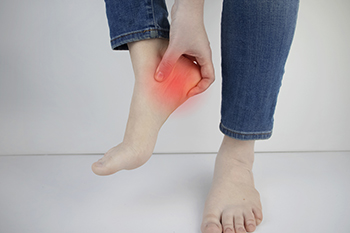
Plantar fasciitis is one of the most common causes of heel pain. The plantar fascia is the thick band of tissue that connects the heel bone to the toes. When this band of connective tissue becomes inflamed, plantar fasciitis occurs. Fortunately, this condition is treatable.
There are several factors that may put you at a greater risk for developing plantar fasciitis. One of the biggest factors is age; plantar fasciitis is common in those between the ages of 40 to 60. People who have jobs that require them to be on their feet are also likely to develop plantar fasciitis. This includes factory workers, teachers, and others who spend a large portion of their day walking around on hard surfaces. Another risk factor is obesity because excess weight can result in extra stress being placed on the plantar fascia.
People with plantar fasciitis often experience a stabbing pain in the heel area. This pain is usually at its worst in the morning, but can also be triggered by periods of standing or sitting. Plantar fasciitis may make it hard to run and walk. It may also make the foot feel stiff and sensitive, which consequently makes walking barefoot difficult.
Treatment for plantar fasciitis depends on the severity of the specific case of the condition. Ice massage applications may be used to reduce pain and inflammation. Physical therapy is often used to treat plantar fasciitis, and this may include stretching exercises. Another treatment option is anti-inflammatory medication, such as ibuprofen.
If you suspect that you have plantar fasciitis, meet with your podiatrist immediately. If left untreated, symptoms may lead to tearing and overstretching of the plantar fascia. The solution is early detection and treatment. Be sure to speak with your podiatrist if you are experiencing heel pain.
 Pain under the heel, especially if you are a jogger or runner, may be a sign that you have plantar fasciitis. This condition affects the plantar fascia, a band of tissue that runs from the heel to the ball of your foot. It is more common with older people, especially women, but can also be the result of repetitive stress, which causes inflammation. This results in pain that may feel worse if you stand a lot or put pressure on your heel. Being overweight also contributes to the discomfort. One thing you can do is cease the activities that are likely causing or aggravating the condition. Taking anti-inflammatory medication may help to dull the pain. Several stretches can help reduce or alleviate the symptoms. For severe cases, it is suggested that you see a podiatrist who can prescribe custom orthotics, administer injections to the affected area, and offer other solutions, such as ultrasound therapy or even surgery.
Pain under the heel, especially if you are a jogger or runner, may be a sign that you have plantar fasciitis. This condition affects the plantar fascia, a band of tissue that runs from the heel to the ball of your foot. It is more common with older people, especially women, but can also be the result of repetitive stress, which causes inflammation. This results in pain that may feel worse if you stand a lot or put pressure on your heel. Being overweight also contributes to the discomfort. One thing you can do is cease the activities that are likely causing or aggravating the condition. Taking anti-inflammatory medication may help to dull the pain. Several stretches can help reduce or alleviate the symptoms. For severe cases, it is suggested that you see a podiatrist who can prescribe custom orthotics, administer injections to the affected area, and offer other solutions, such as ultrasound therapy or even surgery.
Plantar fasciitis is a common foot condition that is often caused by a strain injury. If you are experiencing heel pain or symptoms of plantar fasciitis, contact Dr. Edward D. Hutson from Easton, PA. . Our doctor can provide the care you need to keep you pain-free and on your feet.
What Is Plantar Fasciitis?
Plantar fasciitis is one of the most common causes of heel pain. The plantar fascia is a ligament that connects your heel to the front of your foot. When this ligament becomes inflamed, plantar fasciitis is the result. If you have plantar fasciitis you will have a stabbing pain that usually occurs with your first steps in the morning. As the day progresses and you walk around more, this pain will start to disappear, but it will return after long periods of standing or sitting.
What Causes Plantar Fasciitis?
There are some risk factors that may make you more likely to develop plantar fasciitis compared to others. The condition most commonly affects adults between the ages of 40 and 60. It also tends to affect people who are obese because the extra pounds result in extra stress being placed on the plantar fascia.
Prevention
There are a variety of treatment options available for plantar fasciitis along with the pain that accompanies it. Additionally, physical therapy is a very important component in the treatment process. It is important that you meet with your podiatrist to determine which treatment option is best for you.
If you have any questions, please feel free to contact our offices located in Easton, and Northampton, PA . We offer the newest diagnostic and treatment technologies for all your foot care needs.